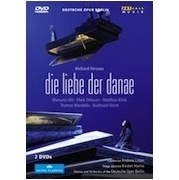For background and plot of this opera, composed in 1940, given a private performance in ’42 but never performed during the composer’s lifetime, please refer to Victor Carr’s review of a CD version recorded a few years ago (type Q3294 in Search Reviews). Its premiere in 1944, incidentally, was put off due to the attempted assassination of Hitler: all of the theaters were immediately closed, including Salzburg, where it was to have taken place.
This is the first available DVD of this peculiar opera and it is given here, in a January, 2011 performance from the Deutsche Oper Berlin, in a peculiar production. Kirsten Harms is the director, Bernd Damovsky the set designer, and Dorothea Katzer the costumer. The opera is updated–no problem there–and Pollux’s palace is a large living room with walls covered in art: these are taken by his creditors. When the room is nearly empty, the piano that was stage center suddenly flies upside-down to the ceiling and remains there for the remainder of the opera. Is it a threat? Is music hanging over everything? Is it just irritating and weird? I vote for the last choice.
By the last act, when Jupiter strips Danae of her gold, the room’s walls collapse and the stage is in ruins–this, in place of Strauss’ designated desert. Okay by me, but there’s still that piano. Harms’ direction is entertaining, with Jupiter an arrogant, horny dude and his ex-lovers fancy floozies (all the costumes are 1940s or ’50s and a bit garish), and the crowds are well-handled. There’s occasionally too much coming and going of principals, but it’s not a real bother. And then there’s that piano again: don’t blame me for bringing it up; it’s omnipresent and must be acknowledged. Pages of music fall from it early on–do they stand in for gold?
The opera is uneven, to say the least. There are several choral/crowd scenes (not Strauss’ forte) that are musically overly busy, and not nearly enough of the rhapsodic, long-limbed melodies of which he was the master. But the third act is ravishingly orchestrated (as are parts of the first) and contains a long, stunning duet for Midas and Danae.
In the title role Manuela Uhl may lack vocal beauty and absolute steadiness, but she’s thoroughly involved and sings with a superb sense of what Strauss wanted. Matthias Klink is her Midas, singing with a voice a size too small for the part, but nonetheless singing quite well and acting and looking the part. Mark Delavan is stuck with the very difficult bass-baritone role of Jupiter–a long, big “sing”–but he throws himself into it and convinces. All of the other characters are comic–Jupiter’s previous lovers, even Pollux (a fine Burkhard Ulrich)–save for Xanthe, Danae’s handmaiden/friend, prettily sung by Hulkar Sabirova, whose voice mingles well with Uhl’s in their first-act duet.
Andrew Litton leads with a sure hand and is helpful to the singers in their difficult assignments. He opts to cut a last-act duet between Danae and Jupiter, probably to spare Delavan, but it’s a beautiful duet, and since the opera is already so long, another 10 minutes hardly would have hurt it. The opera is somewhat better sung on CD (there are three recordings) but this is the only video version. If you love Strauss, this is of course a necessity, but as good as it is, it could have been better.
































